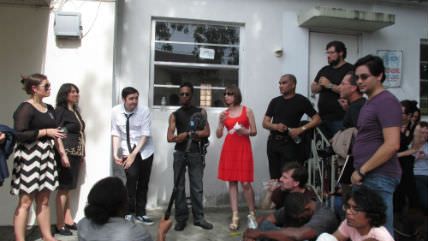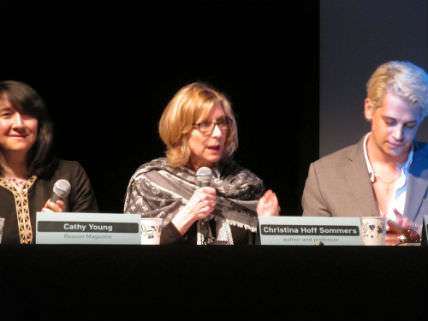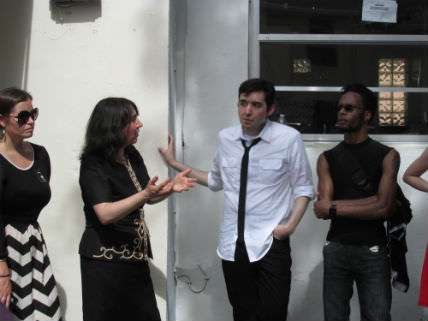Bomb Threat Disrupts SPJ Airplay #GamerGate Debate
Event at SPJ conference on one year anniversary of GamerGate continued despite the threat.

We're coming up on the first anniversary of GamerGate, the online phenomenon variously described as a consumer revolt against unethical videogame journalism, an Internet mob targeting women in technology, a white male hate and harassment group, and a resistance movement against authoritarian "social justice warriors." During this year, there has been a steady stream of articles announcing the end of #GamerGate—literally from day one, when the hashtag's first appearance was greeted with several stories on gaming and pop culture websites heralding the "death of gamers" as a culture. And yet last Saturday, both gamers and GamerGate were very much alive at a remarkable event held as part of the 2015 regional conference of the Society of Professional Journalists (SPJ) in Miami: Airplay, a two-session panel presenting the pro-GamerGate side of the story to the media.

I was one of the Airplay panelists. (Transparency time: while I received no fee, money for my expenses was raised through crowdfunding, primarily by GamerGaters who agreed to help defray the costs of the panel.) There was insightful and interesting discussion. There were contentious moments. And it all ended, just like the GamerGate meetup in Washington, DC in May, with a bomb threat and an evacuation that cut the event short.
No one knows for sure who was behind the bomb threat. Responsibility has been publicly claimed by a member of an Internet troll nest that has been described as "aligned" with GamerGate by the movement's critics but that GamerGaters themselves generally regard as hostile. (The same shadowy group had previously harassed people on both sides of GamerGate, including a leading GamerGate blogger, "The Ralph Retort.")
But even assuming that GamerGate's ideological enemies had nothing to do with disrupting Airplay, they certainly tried hard to stop it. Airplay's organizer, SPJ regional chapter president Michael Koretzky—who had decided to host the event after engaging with GamerGate members on Twitter—detailed some of those efforts on his blog. Emails sent to SPJ accused Koretzky of providing a forum to people who had "a history of threatening people online" and even of endangering "support organizations for victims of abuse." Koretzky also says he received several emails with "vague threats" to his career.
Koretzky, a veteran journalist and ornery First Amendment champion, went ahead with Airplay—though his initial plans for a debate format were foiled by the fact that no GamerGate critics would agree to participate. Instead, the non-GamerGate side was represented by three "neutrals": journalists Lynn Walsh of NBC 7 San Diego and Ren LaForme of the Poynter Institute, and game developer Derek Smart. The pro-GamerGate lineup had dissident feminist Christina Hoff Sommers, Breitbart gadfly Milo Yiannopolous, Washington Examiner's Ashe Schow, Breitbart's token leftist (yes, really!) Allum Bokhari, and games writer Mark Ceb.
Mindful of the bomb threat in DC, Koretzky took numerous precautions to ensure that the premises—Koubek Center on the Miami-Dade College campus—were secure. The initial plan was that if a bomb threat were called in, it would clearly be a fake and the panel could continue—with the option for anyone to leave if they wanted to do so. The morning session proceeded without a glitch, other than several participants getting "doxxed" (i.e. having their home addresses and/or telephone numbers posted) in the comments on the livestream; as a result, the comments were disabled for the second session. As everyone returned from lunch, Koretzky announced that there had been a bomb threat and that the panel would proceed as planned. No one left and the two-hour session got underway; but about forty minutes before it was scheduled to end, the police arrived with orders to evacuate the entire building.
As we wandered out into the tropical heat, joined by perplexed journalists who had been attending the main SPJ conference in the adjoining building, we learned that this time the bomb threat had been sent to the Miami Police Department and The Miami Herald; it also mentioned the precise time of the promised explosion (2:45), which apparently lent it more credibility.
At first the attendees took this in stride, chatting cheerfully outside, giving interviews, and posing for photo ops while more police cars and fire trucks pulled up. But as we were told to move further away and the center was cordoned off with yellow tape—and a quick exploration made it clear that there was no café or other shelter within walking distance—things began to get frustrating. (Leaving was not an option for most people, who either had cars in the Center's parking garage or had left some of their possessions inside.) One woman from the GamerGate audience nearly passed out from the heat. Thankfully, a few helpful Gaters trekked to a nearby gas station and came back with a large supply of bottled water.
Remarkably, the GamerGaters also wanted to know if the interrupted panel was going to resume. After about two hours of sweltering with no end in sight, Koretzky came up with a bold solution, directing us to a fenced-off condemned building fence with a porch and an overhang that provided some shade—and a prominent no-trespassing sign. "The bomb threat was illegal, crashing a condemned house in front of a cop car is illegal—they cancel each other out," he quipped. And that was where we did the Q & A that had been cut off by the cops' arrival. (Some of the panelists had left in a cab earlier; their place was taken by writer and former games journalist Oliver Campbell, who had been slated as one of the speakers but had dropped out due to a conflict with Koretzky—who graciously encouraged him to step up and join the panel, to boisterous applause.)

Some of the regular SPJ attendees came up to listen as well; they knew nothing about GamerGate, but seemed genuinely impressed by the crowd's dedication. A middle-aged man later identified as Jack Pagano said that he has been working in Afghanistan for several years and has seen many a bomb scare—but this was the first time he'd seen people stay to conclude a discussion in the middle of one: "This is really an inspiration to see that people are staying. Usually a bomb threat cancels everything, but you've decided to stay here and continue because you're devoted to your mission and you're passionate about your craft." Of course, a bomb threat in Kabul carries a lot more weight than on a college campus in Miami. Nonetheless, it was a heartfelt compliment that provided some reward for the dehydration.
And other than that, how was the event? It's difficult for me to judge from the inside. Anti-GamerGate commentators like New York magazine's Jesse Singal tweeted during the morning session, which focused on issues of ethics in gaming journalism and GamerGate's specific complaints, that it was "a train wreck" and that the session's GamerGate panelists (Schow, Bokhari, and Ceb) clearly didn't understand the first thing about journalism. Yet the neutral panelists seemed to agree that GamerGate had legitimate grievances and that the main two examples cited—a Kotaku writer giving a rave review to a friend's game without disclosing the connection, and an extremely dubious rape allegation against Cards Against Humanity creator Max Temkin being treated as fact—were indeed examples of poor ethics. (While the article on Temkin was later amended to include a correction, Walsh seemed to agree it was inadequate.) There were also collective guffaws at the notion of the journalistic value of Gawker, which ranks high among GamerGate's enemies.
The afternoon panel, with Yiannopoulous, Sommers, and myself on the pro-GamerGate side, was somewhat more problematic because of a disconnect in expectations. Koretzky wanted to focus on the issue of how the mainstream media should cover leaderless online movements like GamerGate. Yiannopolous and Sommers wanted to talk about cultural and gender politics; I had planned to discuss the problems in media coverage of GamerGate (which, as I said on the panel, may well be the worst, most one-sided journalism I've seen in my entire career) as well as their intersection with larger narratives on gender, such as the claim that women are the primary targets of online harassment. Koretzky's attempts to steer the conversation into the direction he wanted led to some occasionally tense verbal sparring between him and the charismatic, showy Yiannopoulous and to some interruptions that annoyed the audience.
On his blog, Koretzky wrote that he felt the morning session was a success while the afternoon session (during which #shutupkoretzky was trending on Twitter) was such a disaster that the bomb threat was a "mercy killing." I, from my admittedly subjective perspective, thought we were finally starting to get somewhere when things came to an abrupt halt.
In an email exchange after the event, SPJ's Walsh gave the morning session high marks: "I think this may be my favorite panel I have ever been asked to speak on and be a part of." She felt that the afternoon event wasn't quite as productive. Developer and entrepreneur Elissa Shevinsky, CEO of Jekudo privacy company, who watched Airplay on livestream, thought the fault lay with Koretzky's moderation and his attempts to keep gender issues out. "It's impossible to talk about GamerGate without including gender in the discussion," Shevinsky told me.
Despite the rough patches (which led some "antis" on Twitter to suggest that GamerGaters called in the bomb threat on their own event to save face), the afternoon session had plenty of positives for GamerGate. Both Koretzky and the "neutrals" seemed impressed by the examples of skewed media coverage of GamerGate. While faulting Yiannopoulous for mixing too much opinion with his reporting, Koretzky also told him that a prominent GamerGate opponent had complimented the accuracy of his scathing reports on anti-GamerGate crusader Randi Harper. Walsh agreed that claims of harassment, and accusations leveled at GamerGate as the responsible party, needed to be fact-checked and critically examined. Everyone seemed to concede that the media needed to do a better job of reaching out to GamerGate members.
Shevinsky, who considers herself a GamerGate neutral—and is a prominent advocate for women in tech—thought that Airplay was an important step forward. "I believe that extremists on both sides of GamerGate have been hijacking what could otherwise be an important conversation about free speech, artistic expression and gender equality," she told me. "It says a lot that GamerGate took this opportunity for civil discourse so seriously. The panelists came a long way to have this conversation, and were thoughtful with their answers."
If nothing else, SPJAirplay showed that GamerGate is far from over. The hashtag #SPJAirplay was trending in the U.S., the UK, and Canada even before the bomb scare. The YouTube videos of Airplay got well over 100,000 combined views.
The aftermath of the event also provided a striking example of the media bias we discussed. Last October, The New York Times ran a front-page story of the cancellation of feminist videogame critic Anita Sarkeesian's scheduled talk at Utah State University after an email threatening a mass shooting—and insinuated, with no evidence, that the threat came from someone "allied" with the GamerGate movement. It did not see fit to run so much as a brief news item about a bomb threat disruption of a journalism conference that gave GamerGate supporters a chance to speak.
Correction: This piece originally identified Mark Ceb as a games developer. He is a games writer.


Show Comments (32)